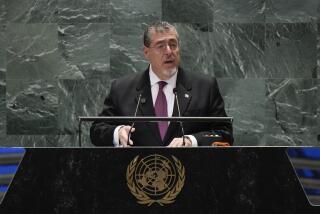Caribbean States Want U.N. in Drug War : Smuggling: Jamaica and the Bahamas seek to draw attention away from the U.S. presence in drug-troubled countries.
- Share via
NASSAU, Bahamas — After more than a decade as the main strategic battlefront in the U.S. war on drugs, the mini-states of the Caribbean, led by Jamaica and the Bahamas, have opened a campaign to draw the United Nations into an active anti-drug combat role.
The aim is to ease sensitivities over too great an American presence in drug-troubled countries such as Colombia, Bolivia and Peru.
Prime Ministers Michael Manley of Jamaica and Lynden O. Pindling of the Bahamas have called for a rapid U.N. deployment force that would interdict drug shipments, eradicate drug crops, ferret out anti-narcotics intelligence and even mount paramilitary-style raids against drug traffickers--the way U.S. Drug Enforcement Administration, Coast Guard and military units try to do in cooperating countries.
The force would be similar to U.N. peacekeeping forces that have been deployed in many of the world’s hot spots, according to the two prime ministers.
Armed with the unanimous support of the Caribbean Community and Common Market, made up of the English-speaking countries of the region, the two last week sought broader support at the annual meeting of the British Commonwealth nations in Kuala Lumpur, Malaysia.
Pindling said in a recent interview that he will also lobby for support at a summit of 15 regional heads of state, including President Bush, scheduled to be held in Costa Rica on Friday and Saturday. And he said he will press for adoption of the scheme at a special U.N. General Assembly meeting on drugs due to convene sometime before next February.
According to Pindling, the multinational force could be formed and in action within six months if major powers such as the United States get behind the idea.
“If we are serious, we could pass the resolution at the U.N. this year,” Pindling said. “. . . If they’re serious about a narcotics eradication program, they could put it together in three months and have it operational in six. It all depends on how serious those countries which have the capability are.”
Because both countries now cooperate closely with American anti-narcotics forces, U.S. officials are reluctant to muddy relations by publicly criticizing the Manley-Pindling scheme. But some U.S. veterans of the Caribbean front of the drug war expressed deep reservations and cautioned that even if an armed U.N. force is formed, it would be incredibly expensive.
“We would probably have to bankroll it, and we wouldn’t get as much bang for the buck as we get now in bilateral programs such as our joint operations in the Bahamas,” one official said. “The Bahamas operation alone costs $30 million to $40 million annually. I’m not sure there’s enough jam to cover all that bread.”
Another U.S. specialist dismissed the Bahamian prime minister’s support of the U.N. proposal as little more than an attempt to scrub up an unsavory image imprinted on the Bahamas government by U.S. indictments of several close Pindling associates on drug-related charges. “He wants to be seen as part of the solution to the drug crisis rather than as part of the problem,” the specialist said.
But another American drug expert said the idea is a good one, regardless of Pindling’s motives, because it would make outside assistance more acceptable to politically sensitive Latin nations.
“A U.N. helicopter squadron would help immeasurably in some places,” he said.
Pindling acknowledged that the idea of forming an armed U.N. force to conduct aggressive military operations against the drug barons might be hard to sell to the international organization, which has deployed troops only for peacekeeping purposes since the Korean War.
“But if it’s not possible to have that kind of (armed) force, at least it may be able to take part in the eradication of drug-producing centers and crops,” he said. “It might be easier to deal with that rather than with street-to-street, house-to-house law enforcement.”
Pindling said he envisages a narcotics enforcement support office at the United Nations with high-tech intelligence capabilities, such as satellite surveillance aimed at pinpointing drug crops and cocaine factories, as well as international financial specialists with the power to track down drug traffickers and their financial networks.
The task is urgent, Pindling declared.
“It’s made even more urgent by what is happening now in Colombia,” he said. “How long will it take before Colombia self-destructs? Before the whole economy is shattered? And if it progresses to Bolivia and Peru, it may lead them to similar self-destruction. We just can’t devastate three countries like that. They need help. We need help. It’s urgent.”
More to Read
Sign up for Essential California
The most important California stories and recommendations in your inbox every morning.
You may occasionally receive promotional content from the Los Angeles Times.













